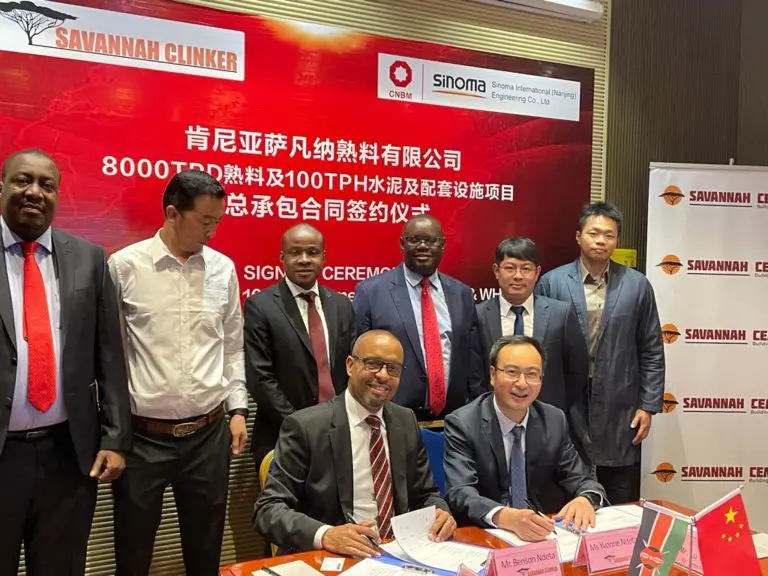Sinoma International Engineering, a Chinese company, has been contracted by Savannah Clinker Ltd. to build an Sh36.9bn Kitui clinker plant. Located in Kitui County, its construction will cost roughly Sh36.9 billion ($300 million).
The captive per plate heat recovery system of 25 megawatts (MM), as well as associated infrastructure and amenities, is installed at the 8, 000 tonne per day clinker plant with a 2,400 frind cement plant.
Read also: US$ 300M OCC Rusayl Clinker Plant expansion project in the offing
The project will start immediately in Mwingi North and take two and a half years to complete.
According to Savannah Clinker Ltd. Chairman Benson Ndeta, the Kitui clinker plant will crush locally sourced limestone to clinker. It will also include a 100 ton per hour cement grinding system, product packaging, and delivery systems.
Within five years of initial clinker extraction, he added, it will be the first plant in the region to achieve this by replacing fossil fuel based power requirements with a combination of solar power and thermal recirculation.
The Eastern Province region’s economic activity will also be bolstered by what will be the largest industrial investment ever undertaken there.
How the Kitui clinker plant will benefit people
5,000 workers will be employed for the project during construction. Additionally, another 10,000 workers will secure jobs after its construction is completed.
One of the biggest cement factory contractors in the world, Sinoma International, recently secured contracts to also expand Dangote Cement in Nigeria for $500 million and MOROC Cement in Ethiopia for $22 million.
The country currently imports 3.5 million tons of clinker from Middle Eastern countries. The imported clinker is to make up the shortfall of its installed 15 million tons of cement grinding capacity. It is said that it needs to be matched by a capacity of nearly 10 million tons of clinker.
This backward integration project aims to save the nation over $100 million annually in foreign exchange used to import clinker.
Additionally, since the COVID pandemic began, the price of clinker has more than doubled globally. The increase in price has made it practically difficult for producers without local production capacities to import clinker for cement production.
Within ten years of starting operation, the plant is designed to completely remove or greatly reduce its carbon footprint. The Kitui clinker plant is expected to use the right carbon capture technology.
The project’s environmental, sustainability, and governance consultancy, Longevity Development, has agreed to manage a ten year, US$50–100 million environmental, social, and governance investment program. The governance investment program includes the carbon mitigation strategy.

Leave a Reply